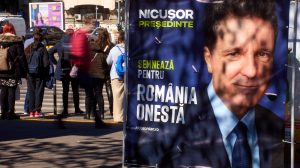Should Azerbaijan capture and hold the town of Shusha, a negotiated peace looks impossible.
Armed conflict in the disputed region of Nagorno-Karabakh continues, with Azerbaijan this week claiming to have recaptured the symbolic town of Shusha (known in Armenian as Shushi), a claim denied, however, by Armenian officials.
Fighting in the region, which began in September, has so far claimed as many as 5,000 lives – both military and civilian – while more than 90,000 people have been displaced as a result of shelling. According to Tatevik Stepanyan, Armenia’s deputy minister of labour and social affairs, almost 40,000 inhabitants of the Nagorno-Karabakh region, internationally recognised as Azerbaijani territory but under the de facto control of Armenians since a ceasefire was agreed between the two countries to end a previous war in 1994, have fled to Armenia.
Shusha is Nagorno-Karabakh’s second largest city, a mountaintop settlement that was mostly populated by Azeris before the war in the 1990s. It is strategically located on the main corridor connecting the territory with Armenia – the Lachin Highway – and is regarded by both sides as an important spiritual centre.
“[This day] will become a great day in the history of Azerbaijan,” said Azerbaijan’s president, Ilham Aliyev, in a televised address on Sunday, announcing the recapture of Shusha. The Nagorno-Karabakh authorities however said that despite heavy destruction from high-calibre artillery, “the fortress city withstands the blows of the enemy”. Nevertheless, there were celebrations in the Azerbaijani capital Baku.
The fighting is increasingly drawing in multiple geopolitical actors, exacerbating hostilities between the two sides. Turkey is offering support to Azerbaijan, while Russia has forces stationed in Armenia and is bound by the Collective Security Treaty Organisation, a mutual defence agreement. However, Moscow, which sells arms to both sides, currently appears wary of honouring its military agreement with Armenia which it says applies only if the violence extends to recognised Armenian territory.
Two Russian and one US brokered ceasefire have done nothing to stop the hostilities, with each side immediately accusing the other of violations.
The fierce fighting over the weekend comes amid reports that Ankara and Moscow have drawn up a new draft ceasefire deal under which Armenia would surrender five of the seven Azerbaijani regions it currently occupies and agree to the establishment of a new corridor connecting Baku to the Azerbaijan territory of Nakhchivan, which is surrounded by Armenian land.
Turkish and Russian peacekeeping forces would then be deployed to uphold the ceasefire, it has been reported.
This is unlikely to happen, however, without at least one more push by Azerbaijan to take full control of Shusha and the Lachin Highway.
According to Neil Hauer, a security analyst currently in Yerevan, where he is observing the war, the cultural and symbolic importance of Shusha has led to some describing it as “Azerbaijan’s St. Petersburg.”
“The slogan ‘To Shusha’ is a common refrain in Azerbaijan, and President Ilham Aliyev himself has repeatedly stated that ‘without the liberation of Shusha, our victory is incomplete.’”
Hauer says the period around mid-November is going to decide the Karabakh war.
“If the Armenians can somehow push the Azeris back and hold their high-ground positions, they stand a chance of stabilising and forcing this war into a stalemate,” he writes in Arab News.
“If Azeri forces push up to Shushi and seize it, they will have a commanding position over the remainder of Karabakh — not least of which, over Stepanakert, the capital that lies neatly below the mountain, just 10 kilometres away. For the Armenians then to retake a position like Shushi would be near-impossible, something the Azeris discovered the hard way after they lost it in the first war in 1992. There will still be hard street to street fighting ahead, but their gains will be all but cemented.”
—
Unlike many news and information platforms, Emerging Europe is free to read, and always will be. There is no paywall here. We are independent, not affiliated with nor representing any political party or business organisation. We want the very best for emerging Europe, nothing more, nothing less. Your support will help us continue to spread the word about this amazing region.
You can contribute here. Thank you.






[…] that the key city of Shusha (known as Shushi in Armenia), the second-biggest city in the enclave, had been taken by Azeri forces, was described by Armenian Prime Minister Nikol Pashinyan as “unspeakably […]